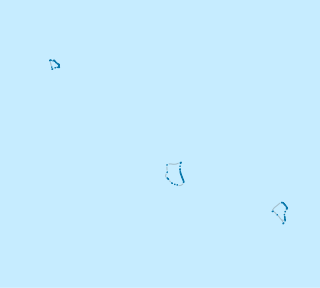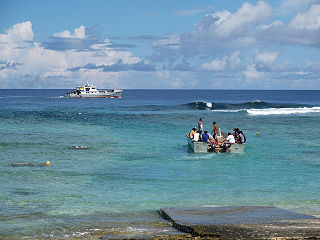
Tokelau is a dependent territory of New Zealand in the southern Pacific Ocean. It consists of three tropical coral atolls: Atafu, Nukunonu, and Fakaofo. They have a combined land area of 10 km2 (4 sq mi). In addition to these three, Swains Island, which forms part of the same archipelago, is the subject of an ongoing territorial dispute; it is currently administered by the United States as part of American Samoa. Tokelau lies north of the Samoan Islands, east of Tuvalu, south of the Phoenix Islands, southwest of the more distant Line Islands, and northwest of the Cook Islands.

Pio Iosefo Tuia has been Ulu o Tokelau, head of government of Tokelau, six times. The position of ulu rotates annually between the three faipule, who are elected for terms lasting three years. Tuia served as ulu for the sixth time in February 2011. He was also the faipule of Nukunonu and a member of the Council for the Ongoing Government of Tokelau.

The office of head of government of Tokelau, often simply called the Ulu, rotates yearly between the faipule (leaders) of Tokelau's three atolls: Atafu, Fakaofo, and Nukunonu. The current Ulu is Alapati Tavite, the Faipule of Nukunonu atoll, who has held the position since 12 March 2024.

Kuresa Nasau is a Tokelauan politician who has served as head of government five times and as faipule of Atafu.

A referendum on self-determination was held in Tokelau on 20 October and on 22–24 October 2007, with the result being that self-governance was rejected. Had it been successful, the referendum would have changed Tokelau's status from an unincorporated New Zealand territory to a self-governing state in free association with New Zealand, akin to the Cook Islands and Niue. However, the referendum required a two-thirds positive vote to pass, and the "yes" side fell short of the required total by 16 votes.

Parliamentary elections were held in Tokelau on 17 January, 18 January and 19 January 2008 to elect the 20 members of the General Fono. The elections saw Kolouei O'Brien replaced as faipule of Fakaofo by Foua Toloa.

The following outline is provided as an overview of and topical guide to Tokelau:

The Council for the Ongoing Government of Tokelau is the executive body in Tokelau. It serves as the governing organization for Tokelau when the General Fono is not in session. The council has six members, consisting of the faipule (leader) and pulenuku of each of the three atolls, Fakaofo, Nukunonu, and Atafu. It was established in November 2003, replacing the Council of Faipule, which had been established in 1993 and had three members – the three faipule.

Salesio Lui is a Tokelauan politician. He was the head of government of Tokelau from February 1993 to February 1994 and again from 1 March 2013 to 24 February 2014.

Foua Toloa was a Tokelauan politician who served as the Head of the Government of Tokelau, or Ulu, from 21 February 2009, to 21 February 2010. He was a member of the Council for the Ongoing Government of Tokelau, and was a faipule on Fakaofo. As the office of Ulu rotates on an annual basis, Toloa resumed office on 21 February 2011. For a time in 2011-2012, he was also Tokelau's minister for Finance, Telecommunication, Energy and Transport.

Tokelau has two official languages: Tokelauan and English. Over 90% of the population speaks Tokelauan, and just under 60% speak English. Also, 45.8% of the population speak Samoan, and small percentages of the population speak Tuvaluan and Kiribati.
Aliki Kelihiano Kalolo is a Tokelauan politician who has served several times as the Head of the Government of Tokelau, or Ulu, most recently from 6 March 2023 to 12 March 2024. He previously served in the same position from February 2012 to March 2013, again from 12 March 2019 to 9 March 2020, and again from 8 March 2021 to 19 May 2022. He is a member of the Council for the Ongoing Government of Tokelau, serving as Minister for Foreign Affairs, Education, Economic Development, Natural Resources and the Environment, prior to and then simultaneously to his leadership of the government. The office of Ulu rotates on an annual basis between the faipule of each of the country's three atolls; Kalolo, as faipule of Atafu, took office as Ulu for the first time in 2012.

The vast majority of people in Tokelau are Christians and Christianity plays a significant role in the Tokelauan way of life.

General elections were held in Tokelau between 23 and 31 January 2017.

Siopili Perez is a Tokelauan politician. He served as the Head of Government of Tokelau from 23 February 2015 to 8 March 2016, from 6 March 2017 to 5 March 2018 and from 19 May 2022 until 6 March 2023.

General elections were held in Tokelau on 23 January 2020.

The COVID-19 pandemic in Tokelau is part of the ongoing worldwide pandemic of coronavirus disease 2019 caused by severe acute respiratory syndrome coronavirus 2. Tokelau reported its first confirmed case on 21 December 2022. COVID-19 reached all three of Tokelau's main atolls in July 2023, when the government confirmed the community spread of the virus on Fakaofo, the last atoll without infections.

The MV Tokelau was an inter-island ferry which served as Tokelau's main transport connection to the world from 1991 to 2012.

General elections were held in Tokelau on 26 January 2023.











